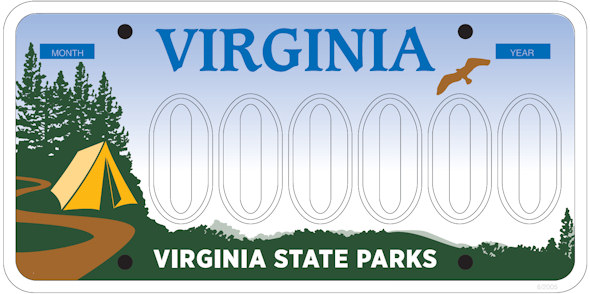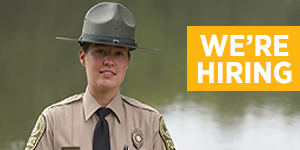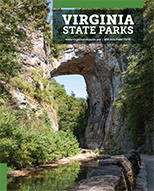Open fires are prohibited throughout the park from midnight to 4 p.m., Feb. 15 through April 30. Learn more.
Leave No Trace at Virginia State Parks
Leave No Trace Center for Outdoor Ethics’ educational mission is to equip recreationalists with information that helps minimize their impacts to the natural world. With reports of staggering visitation increases to our national parks, the rise in eco-tourism and dramatic effects social media has had on previously little-known and wilderness destinations, the world’s shared spaces are receiving more attention than ever.
It’s all of our responsibility to be good stewards of our natural resources, and in the mission of the Department of Conservation and Recreation, we ask you abide by the Seven Principles of Leave No Trace.
Select a topic below to learn more:
Research and planning are crucial in not only keeping us safe, but also minimizing the damage we can potentially do to the environment during our trip. Knowing where the trails and campsites are, how physically capable you’ll need to be in order complete the trip, and even what the weather forecast is like go a long way in preventing you from having to make game-time decisions that can have negative, unnecessary impacts on the landscape you’ll be traveling through.
Your park rangers are a fantastic resource for information about the parks and appropriate activities for your abilities. Many of your questions can be answered by reading through the park pages or at the park visitor center.
Many of the campsites you’ll find at Virginia State Parks are hardened platforms. Building these platforms might seem counter intuitive, but it actually reduces the amount of erosion and wear to the landscape over hundreds and hundreds of uses. As land managers, it’s much more sustainable approach than allowing campers to choose their own sites or camp repeatedly on softer soils.
When traveling too, it’s important to stay on established trails. Don’t cut switchbacks or venture off trail—these behaviors destroy delicate top soils and are harmful to the vegetation there. Further, cutting switch backs contributes to erosion and can harm water quality. The folks who mark and build trials are professionals and have done environmental impact studies to determine the most sustainable course for repeated travel.
A good rule of thumb is that as soon as you create waste to dispose of it immediately. We call that the “one touch rule.” Our rangers can often be seen picking up bits of trash and odds and ends along the trails and roads—we challenge you to follow suit, even if it isn’t yours! Leave it better than you found it.
Human waste should not be an issue in Virginia State Parks as there are bathhouses and restrooms available at all camp sites. Even at primitive sites, access to a port-a-john is provided.
RVs and mobile homes, septic dump station are available for use at many of our parks that provide overnight facilities.
The old adage “Take nothing but photos. Leave nothing but footprints.” is a good starting point for this one. There’s a third bit to that saying too: “Make nothing but memories.” Or as we like to say, “Like it never even happened.” This means if you stack rocks (cairns) as an act of meditation or appreciation, return them to where you found them when you leave.
Avoid damaging trees, delicate soils and vegetation:
Slack liners and hammock campers should either try or use established metal poles or take great caution in slinging up to trees. Be sure not to damage bark; use a pad beneath the sling when necessary, and never carve into trees.
Leave natural and cultural artifacts behind:
Generally we should let things lie where they are—this is to say, “no souvenirs,” unless you get them at the gift shop!
- Unique, smooth rocks, beautiful autumn leaves, wonderfully colored sea shells… these natural artifacts belong to everyone and should not be removed from the natural environment. Our resources are finite, and if everyone were to take one something, eventually, there would be nothing.
- Cultural artifacts are protected by legal means—if you find indigenous peoples, revolutionary war, or civil war artifacts, you should turn them into the park office or notify a ranger of what and where your discovery was. Virginia’s history is all of our history, and the artifacts that come with it should remain in the public—not in your private collection.
Virginia State Parks designated campsites where fire are permitted have established campfire rings. Fires are not permitted outside the fire rings.
Best practices are to allow the wood to burn completely to ash in a controlled manner where all the fuel is consumed. Your fire should never be unattended. If there’s smoke, someone should be there to tend to it.
Don’t throw trash in your fire. Paper products for igniting the fire are understandable, but aluminum cans and bottle caps should be recycled and other garbage should be disposed of properly.
When you’re done with the fire, douse it in water. The simplest way to ensure a fire won’t reignite, as hot embers and dehydrated fuel are liable to do if left alone, is to douse the hot embers with water and stir everything together with a metal shovel. Douse your embers in water, stir them with the shovel and repeat.
A crucial and often overlooked element of wilderness travel, not respecting wildlife can have dramatic consequences for you and everyone who comes after you. Proper food storage is critical, especially in regard to keeping wildlife wild. Bears for example are opportunistic eaters with an incredible sense of smell—improperly stored food can woo bears into designated camping and other highly traveled areas. This repeated exposure to man-made infrastructure and food, and potential human contact desensitizes wild animals making them more dangerous to future visitors.
KEEP YOUR DISTANCE. In General, the more familiar wildlife becomes with human contact, the more dangerous it can become for visitors. Stay 25 yards away from large animals like deer and elk, and 100 yards away from wolves and bears.
Consideration of others has really been brought to the forefront as visitation continues to increase—it’s more likely that you’ll bump into other guests during your visit, which Is why it’s so important we all practice a bit of courtesy and trail etiquette.
- Pets:
Pets are welcome in all our parks, but must be kept on a leash no longer than 6’ at all times. - Right of Way:
Many of our trails are multi-use, meaning you’ll see horseback riders, mountain bikers and hikers alike enjoying the trail. Right of way goes to horseback riders first as the horses are likely to cause the most damage off-trail. Bikers and hikers should move off trail onto a durable surface as the horses and riders pass—be sure to remain calm and speak softly as horses can be easily startled.
Mountain bikers are to yield to others and maintain control of their speed. For hikers: downhill hikers are to yield to uphill hikers. There are always exceptions to the rules, for instance, I yield to the elderly almost unconditionally, but in general, right of way is intended to give the more difficult mode of transportation the advantage.
Also, be sure to take breaks off trail and on durable surfaces. If for example, you are out on a long day hike, don’t stop for lunch sitting on the trail blocking the path of others. Find a nice spot off trail, enjoy your meal, pack out your garbage and food remains, and leave that space as if you were never there at all. - Noise:
Other ways we can be considerate of others are to keep noise down in camp. Quiet hours are from 10 p.m. to 8 a.m. On-trail, too—open air music is frowned upon. A good question to ask yourself is, “Are my decisions effecting the experiences of others?”
Learn More about the Seven Principles of Leave No Trace.
Order your Virginia State Parks
license plate













